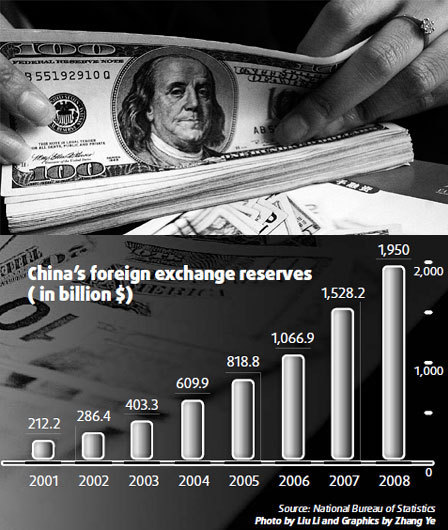
|
BIZCHINA> Top Biz News
 |
|
China still prefers Treasuries
(China Daily)
Updated: 2009-03-09 07:49
 US Treasuries remain an important part of the investment strategy for China's foreign exchange reserves, though Beijing is buying less long-term debt as interest rates fall, an influential economist said.
Concerns that huge new debt issuance by the US government will erode the value of China's dollar holdings have led to calls by some in Beijing policy circles for it to diversify its foreign exchange reserves away from Treasuries, of which China is currently the biggest holder. Worries that China could lose its appetite for Treasuries have in turn helped depress US government debt prices. However, Li said the global financial crisis would only reinforce the importance of seeking secure investments for China's forex reserves, which stood at nearly $2 trillion at the end of 2008. "We are in the middle of a crisis right now, and the priority for foreign exchange reserves is to minimize losses," Li, head of the Institute of Finance and Banking with the Chinese Academy of Social Sciences, said in an interview. "I believe that after this crisis, the percentage of US (assets) will rise," he said, emphasizing that he was expressing his personal views. Li, a former member of the central bank's monetary policy committee, said that with the financial crisis persisting, it was unrealistic for China to carry out any significant diversification of its foreign exchange reserves at this time. "The task is to find a safe place," he said. Still, Li said China had been adjusting the proportion of short and long-term debt in its holdings of Treasuries. "We have been doing this in the past months," he said. "As interest rates are moving lower, we should buy less long-term products and more short-term ones." Li added that China could use part of its newly-added reserves to invest in stakes in companies, but he stressed that it would not mean any big change in the overall portfolio. Recent headline-grabbing deals, including the $19.5 billion investment by Aluminum Corp of China Ltd (Chalco) in Rio Tinto, are conducted on a "commercial" basis, not a "national strategy" one, he said. China need not rush to buy oil or commodities as their prices could consolidate further in coming years, Li said. Gold is currently too expensive and gold prices may plunge as soon as the global economy and investor confidence recover, he added. Li said that, at the upcoming G20 meeting in London, China may ask countries with major reserve currencies to try to achieve greater stability in their exchange rates and avoid big swings, which he said are harmful to the global economy because they promote disorderly capital flows. The crisis has told us that a completely free floating exchange rate is not in the interest of anyone," Li said. "It is time to dump market fundamentalism on exchange rates." China hopes for a global monetary system marked by "transparency, management and accountability," Li said, noting that greater exchange rate stability would create a better environment for trade and investment. On that note, he emphasized that China intended to keep its yuan basically stable. "After years of development, we have one lesson to share: exchange rates should be kept stable," he said. "Even if there need to be adjustments, those should be conducted in a controlled and orderly manner." (For more biz stories, please visit Industries)
|
|||||